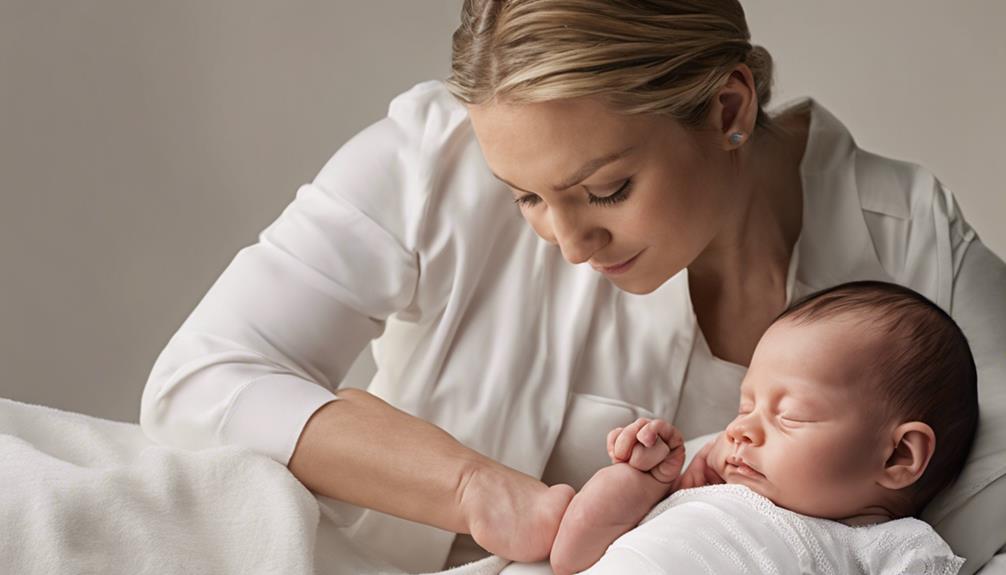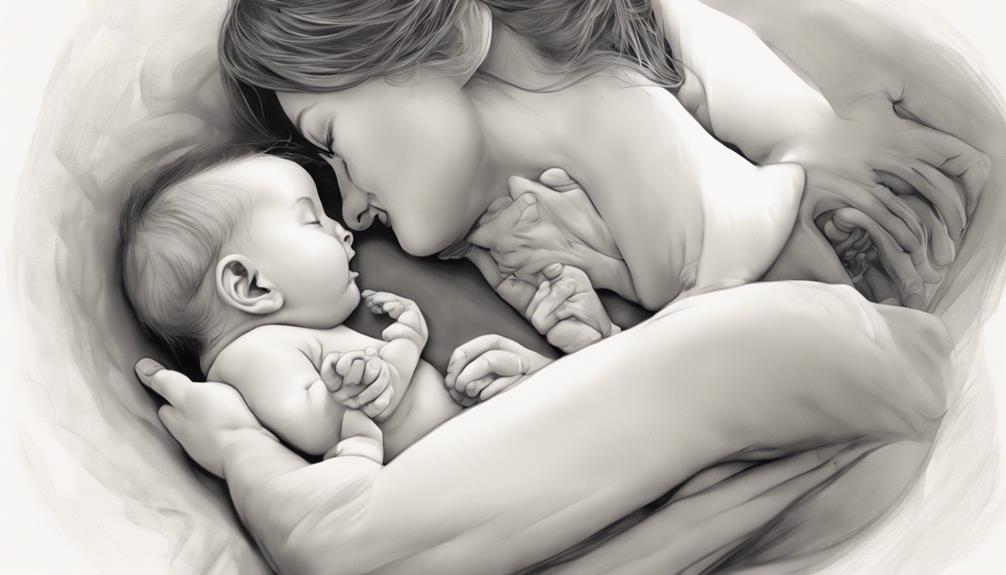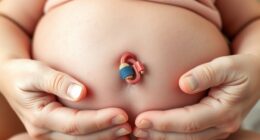You may have tried all the old wives' tales to tame those pesky hiccups in your newborn, but have you considered gentler approaches?
Imagine a scenario where your little one experiences relief without any harsh remedies. What if there were simple, calming methods that could help ease those tiny diaphragms into a hiccup-free state?
Stay tuned to discover the soothing ways you can bid farewell to hiccups in your precious newborn.
Key Takeaways
- Burping during and after feedings helps alleviate hiccups.
- Offering a pacifier can distract and soothe the baby.
- Changing baby's position can relax the diaphragm.
- Gentle techniques like rubbing the back provide comfort and relief.
Causes of Newborn Hiccups
Newborn hiccups can be triggered by various factors such as eating quickly, a bloated stomach, or the Vital Neck Reflex, leading to discomfort for your little one. The diaphragm, an important muscle involved in breathing, can get irritated, causing those quick, jerky motions that manifest as baby hiccups. These hiccups might seem harmless, but they can be bothersome for your baby.
Understanding the causes of newborn hiccups is essential in finding the right remedies to alleviate them. By pinpointing the triggers, you can work towards preventing these episodes from occurring frequently. Identifying what sets off these hiccups, whether it's feeding patterns, stomach issues, or reflexes, can guide you in soothing your baby when they experience these episodes.
Be patient and observant, as each baby is unique, and what works for one mightn't work for another. Your attentiveness and care will help in managing and minimizing the discomfort caused by these baby hiccups.
Gentle Techniques to Stop Hiccups

To help your little one find relief from hiccups, try these gentle techniques that can ease their discomfort.
When your baby has hiccups, try burping them during and after feedings to release trapped air. Offering a pacifier might help relax their diaphragm and stop hiccups gently. Changing your baby's position, such as holding them upright, can aid in relieving hiccups by allowing air bubbles to escape.
Additionally, gently rubbing your baby's back can help dislodge any trapped air that could be causing the hiccups. Remember to focus on safe and gentle techniques specific to babies, avoiding adult remedies.
Burping Strategies for Newborns

Implementing gentle burping strategies after feedings can effectively release trapped air in your little one's stomach, reducing the chances of hiccups. Proper burping techniques are essential for your newborn's comfort.
To help prevent hiccups, make sure to burp your baby during and after each feeding session. This simple act can prevent discomfort caused by trapped gas in their delicate stomach. By gently patting or rubbing your baby's back, you can assist in releasing any air bubbles that may be causing them distress.
Frequent burping not only reduces the risk of hiccups but also supports your newborn's developing digestive system. Remember, the goal is to provide relief for your baby and promote a peaceful feeding experience. Stay attentive to your baby's cues and incorporate burping into your feeding routine to keep hiccups at bay and guarantee your little one stays content and happy.
Pacifiers and Hiccup Relief

Consider offering your newborn a pacifier as a gentle way to relax their diaphragm and potentially alleviate hiccups. Pacifiers can work wonders to soothe your little one during those pesky hiccups.
Here are some reasons why using a pacifier can be beneficial:
- Sucking Motion: The sucking motion when using a pacifier can help distract your baby and interrupt the hiccup reflex.
- Comfort: Pacifiers are safe for babies and provide comfort, mimicking the soothing sensation of breastfeeding.
- Relax Diaphragm: The act of sucking on a pacifier can help relax your newborn's diaphragm, aiding in stopping hiccups.
- Gentle Relief: Using a pacifier is a gentle and non-invasive method to help alleviate hiccups in your newborn.
Next time your baby is troubled by hiccups, offering a pacifier might just be the simple solution you need to bring them comfort and relief.
Position Changes for Hiccup Alleviation

When your newborn is experiencing hiccups, adjusting their position from lying down to upright can help provide relief by easing pressure on the diaphragm. Holding your baby in a more vertical position, particularly during and after feeding, can aid in moving trapped air that triggers hiccups.
You may find it helpful to place your baby on your shoulder or in a slightly inclined position to assist in relieving hiccups by promoting better digestion. Remember to keep your baby upright for at least 20-30 minutes after feeding; this can prevent stomach contents from pushing against the diaphragm and causing hiccups.
Experimenting with different holding positions, such as sitting up or propping your baby on your lap, can help you find the most effective way to stop hiccups. By making these simple adjustments, you can help your little one find comfort and relief from those pesky hiccups.
Frequently Asked Questions
How Do I Relieve My Newborns Hiccups?
To relieve your newborn's hiccups, try burping them during and after feedings, offering a pacifier for relaxation, changing their position to upright, or gently rubbing their back. Avoid adult remedies and prioritize gentle methods for comfort.
Is It OK to Lay Baby Down With Hiccups?
It's okay to lay your baby down with hiccups if they're comfortable. Keeping an eye on their well-being is key. If they seem uneasy, try a gentle upright hold or soothing methods. Comfort and care come first.
What Is the Best Position for Baby Hiccups?
When your newborn has hiccups, holding them upright against your chest can help. This position eases diaphragm pressure. Keep their head slightly elevated and gently pat or rub their back. Create a calm environment.
Do Hiccups Mean Baby Is Full?
Hiccups in babies do not necessarily mean they are full. Various reasons like swallowing air during feeding can trigger hiccups. It's more about diaphragm irritation and immature nervous system than satiety levels.
Conclusion
To summarize, remember that newborn hiccups are a common occurrence that can be managed with gentle techniques. Did you know that on average, newborns can experience hiccups multiple times a day?
By using strategies like burping, offering a pacifier, and changing positions, you can help alleviate your baby's hiccups and create a calm feeding environment. Remember to consult with a healthcare provider if hiccups persist or are accompanied by other symptoms.
Prioritize your baby's comfort and well-being.










